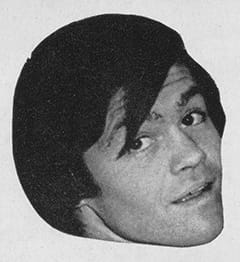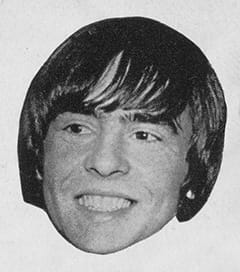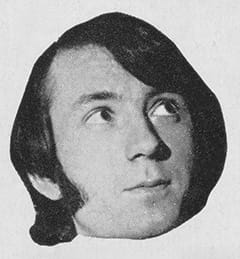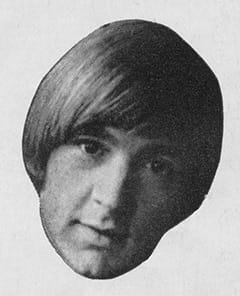Last month we left Mike just after he’d been turned down by the girl he wanted to marry.
But Mike then played the waiting game and after a time asked her again and she said ‘yes’… and you all know that they’ve been happy ever after and that Phyllis now rates as one of the grooviest mums ever to set foot in Hollywood.
What’s surprising about this aspect of Mike’s young life is that hardly anybody wanted to date him! Was he putting us on? But he turned very serious indeed and said: “I’m telling you the truth as I recall it. I’ll say it one more time: I was poor, thin and ugly. The last two still stand—and nobody is more surprised than me to suddenly get this popularity. I read fan letters now saying I’m groovy and all that and I think: Boy, if only I knew these people when I was at College.”
It was a small wedding and Mike took his new role of husband very seriously, trying hard to figure out what he could do in life to ensure a comfortable home for his wife. By this time, he didn’t even own a guitar… though he eventually got one as a Christmas present.
Mike still has that guitar. Now he’s able to buy any instrument that he wants but he regards that first one, though by no means expensive, as being the thing that set him on the way to stardom and to the happiness he’s found as one of the Monkees. Most people would also say that that guitar set him on the road to a fortune, too, but Mike didn’t then, and doesn’t now, set much store by money for its own sake. Happiness and the freedom to do what he wants are more important…
“Well, I got this guitar and I figured that the quickest way to learn to play was by trial and error. So I’d switch on the phonograph and try to pick out the right chords. People told me I must be mad, that the way to do it was to either go to a qualified teacher or at least buy a tutor book. Result is that I do a lot of things with a guitar that just aren’t meant to be done. I’m not what you’d call an expert technician.”
Writing songs Permalink
But Mike also started writing a lot of songs, mostly in the folk idiom and the sort of material which needed only his voice and his guitar to get them across. So far, so good. Phyllis was very keen on helping him in his career and would listen patiently while he went through his latest repertoire.
And Mike talked his way into lowly-paid jobs at clubs in the San Antonio area. He remembers: “There were two ways to get paid. Either you’d take the hat round, like Peter Tork used to do in Greenwich Village, or they’d give you a tiny little salary and maybe a meal as well. I preferred to test my luck on a collection. We needed the money more than I needed a regular meal. Now I figured, for the first time in my life, that I was making progress. I didn’t have the greatest stage presence. I was kinda hung up on trying to do the big personality bit, ending up overselling myself. Maybe I DID have talent, I thought. Maybe it’s worth going on with this scene…
He bought a more expensive guitar and a kazoo as well, to add “variety” to his performances. The bookings got more and more regular. Sure his college work was suffering, but he saw that only as a means to an end… the end being “to enable me to grow up and learn a bit of responsibility. I didn’t want a degree, not now I knew about singing and playing.”
But as we’ll explain next month; Mike was in for a surprise.
And Mike Nesmith went into the U.S. Air Force. That was the big hang-up in his career and it couldn’t have come at a worse time. He was building his name round the clubs of San Antonio and then suddenly he got his draft papers and that was it. Off came the jeans and the black leather tunics; on went the uniform.
Mike is specially quiet about this part of his career. He’s owned up that he didn’t much care for Service life, that he felt it was a frustrating round of routine and that he didn’t get to learn anything new. He told us that he accidentally tipped over a general’s plane one day but there’s a smile up there a-top his 6 ft. 2 in. when he says it; and it is difficult to see how one airman could actually achieve that sort of disaster.
But just for now we’ll leave him in the Air Force, occasionally entertaining his mates in the mess-hall on his guitar. And when things got a bit much for him, he started writing odd bits of poetry—and even a book about his experiences. He says he’ll never have them published, which is a pity because he could be sitting on a gold-mine of entertainment for us, but Mike insists his writings were entirely for his own enjoyment.
We leave him, though, to catch up again with Peter Tork, who we left singing and grinning his way round various clubs in Greenwich Village, arty centre of New York, where many a big pop name learned how to perform in front of audiences.
Office boy Permalink
Peter was a sort of wandering minstrel at this time. He recalls: “The atmosphere there was right for me. Nobody tried to tie me down, bug me over what I should be doing. For a time I worked as an office boy in a theatrical agency, but that got to be a drag. You had to report in every day at the crack of dawn and have the coffee ready.
“For a time, me and my banjo were the best of pals but there were a few days when I thought of hocking it. I learned how to forget about my tummy rumbling through hunger, but it was kinda embarrassing when everybody round me could actually HEAR that I hadn’t had anything to eat. I knew I had to be an entertainer, though.”
One day he met up with a young chap named Steve Stills. They’d both been appearing in the night-clubs in the Village and truth was they looked very much alike. Steve and Peter couldn’t see this, even when they eventually came face to face, but Peter HAD thought it strange when folks had yelled out: “Hiya, Steve, how’re you going?” They met, incidentally, at the Four Winds Cafe, where Bob Dylan has been known to drop in for an evening “blow” with friends.
Steve was very much in the country blues bag, which was fine because that was Peter’s favourite kind of music. He picked away at his banjo, joining in, and obviously the two boys had the ability to make the place rock. So… naturally, they got together as a duo. And this is where Peter learned all about the knack of getting money from customers in the clubs.
Let him explain. “The custom was for the singers to do their numbers and then pass round the basket. Same as passing round a hat, only this was actually a basket used for holding bread… bread bread, that is, not money bread! Well, the people didn’t HAVE to put any money in. But in the end I learned how to put on a special sort of look which kinda reproved them if they made no effort to contribute. It was a sad sort of look, appealing, and you kept your cheeks all sort of hollowed out, making it look like you hadn’t eaten in days.
“Most evenings we earned enough for a slap-up meal, even if we didn’t get sufficient to buy clothes. One night, I remember, I collected 45 dollars on my own account and I felt like a millionaire. Until, that is, a couple of the other musicians reminded me that I owed them around 25 dollars between the two of ’em.”
Despite not enjoying office work, he sometimes thought about taking on a serious day-time job…
“But what threw me was that I seemed to be getting less and less sleep. We’d work around one of the clubs, then eat, then talk about our dreams, Steve and I, of making it to the top in show-business. A new Everly Brothers’ scene would have suited us, for sure, except we’d have been nearer the country-folk sort of music. As a result I’d be lucky to get three hours sleep by the time most ordinary people got to work. Well, that was my excuse for NOT getting a “proper” job, anyway!
“Still, when times got real bad I’d work a few hours as a kitchenboy in one of the million-and-one restaurants in the Village. This meant choosing my own hours, more or less, and that suited me. Another thing. You hear guys saying they couldn’t stand a job which was pure routine. Now I never felt that way about a drudge-type job. It meant that I could do it, and earn money, and still let my mind wander off on great flights of fancy. Like daydreaming that I was starring that night on television—or had been signed to play opposite some glamour-girl in a ten million dollar movie. I didn’t have to THINK about the job, you see… you can actually learn to wash dishes with your eyes closed. I guess I could do it in my sleep, if I really tried.”
Need of help Permalink
But Greenwich Village was right for Peter simply because he made friends and they did all they could to pamper him. “I must have looked in need of help,” he says. “Because I was always being offered something like a meal or a new shirt or new boots or somethin’. Besides, your friends in the Village are REAL friends. They don’t put on airs and graces. You can live cheaply there and that means that people can opt out of the rat-race that goes on outside.”
Peter got his own room, then shared with Steve Stills for a while, then moved on—each apartment lasted for about a month. Sometimes he’d have to quit because he didn’t have the rent. Sometimes he’d be requested to move on because he “made some little extra noise” with his constant rehearsals on his five-string banjo. “Each time I got kicked out there were at least six people ready to offer accommodation until I got fixed up myself again.
NEXT MONTH. Peter hears about the audition for the Monkees!






